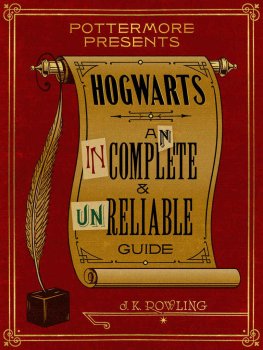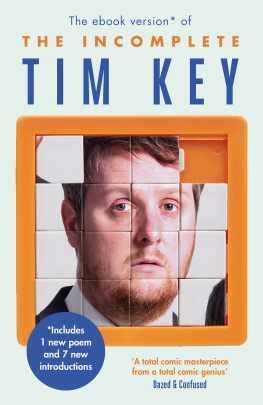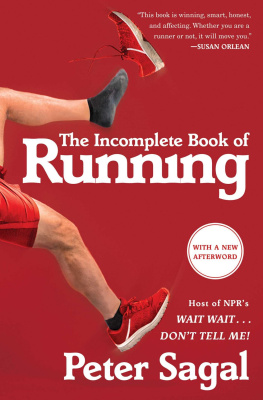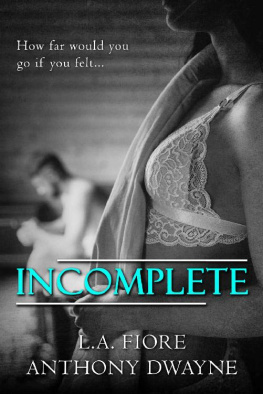Salt and Sage Books - How to Write Black Characters: An Incomplete Guide (Incomplete Guides Book 1)
Here you can read online Salt and Sage Books - How to Write Black Characters: An Incomplete Guide (Incomplete Guides Book 1) full text of the book (entire story) in english for free. Download pdf and epub, get meaning, cover and reviews about this ebook. year: 2020, publisher: Salt and Sage Books, genre: Politics. Description of the work, (preface) as well as reviews are available. Best literature library LitArk.com created for fans of good reading and offers a wide selection of genres:
Romance novel
Science fiction
Adventure
Detective
Science
History
Home and family
Prose
Art
Politics
Computer
Non-fiction
Religion
Business
Children
Humor
Choose a favorite category and find really read worthwhile books. Enjoy immersion in the world of imagination, feel the emotions of the characters or learn something new for yourself, make an fascinating discovery.

- Book:How to Write Black Characters: An Incomplete Guide (Incomplete Guides Book 1)
- Author:
- Publisher:Salt and Sage Books
- Genre:
- Year:2020
- Rating:5 / 5
- Favourites:Add to favourites
- Your mark:
- 100
- 1
- 2
- 3
- 4
- 5
How to Write Black Characters: An Incomplete Guide (Incomplete Guides Book 1): summary, description and annotation
We offer to read an annotation, description, summary or preface (depends on what the author of the book "How to Write Black Characters: An Incomplete Guide (Incomplete Guides Book 1)" wrote himself). If you haven't found the necessary information about the book — write in the comments, we will try to find it.
How to Write Black Characters: An Incomplete Guide (Incomplete Guides Book 1) — read online for free the complete book (whole text) full work
Below is the text of the book, divided by pages. System saving the place of the last page read, allows you to conveniently read the book "How to Write Black Characters: An Incomplete Guide (Incomplete Guides Book 1)" online for free, without having to search again every time where you left off. Put a bookmark, and you can go to the page where you finished reading at any time.
Font size:
Interval:
Bookmark:



Cover designed by Blue Water Books
eBook ISBN 978-1-7349234-0-7
Paperback ISBN 978-1-7349234-2-1
Copyright 2020
All rights reserved.
No part of this book may be reproduced in any form or by any electronic or mechanical means, including information storage and retrieval systems, without written permission from Salt and Sage Books, LLC, except for the use of brief quotations in a book review.
To authors doing their best to create a more diverse, realistic, and beautiful world.
As Salt & Sage is based in the United States, our readers and editors have mainly focused on African Americans for the statistics and references in this document.
The experiences of Black people vary from country to country. As an example, British experiences are broadly similar (e.g., comparable disparities in wealth, representation, etc.), but there is less academic research on it compared to the U.S.A. The first Black Studies degree launched in 2017, the U.K. census included ethnicity for the first time in 1991, and the U.K. has only officially had a Black History Month since the 1980s. For insights on how Black experience can differ in other regions of the world, see , Blackness in Britain.
Dear Reader,
Blackness is not a monolith.
The voices who have joined forces to make this body of work cannot speak to the entirety of the Black experience. We all have a myriad of life events that have shaped us, lived experience that we draw from. What you read here will reflect that.
This guide is intended to be a reference point so that you can be aware of various harmful stereotypes and negative tropes to avoid during your process of crafting Black characters. Even though things are completely fictional, certain aspects of your work will be rooted in real-world issues.
The written word is a form of escape. But for many of us... its more than just words. Some situations will highlight our realities, so handle them with care. We encourage you to be mindful in your approach to both characterization and world-building.
Thanks for reading & happy creating!
Undrea
* * *
I did then what I knew how to do. Now that I know better, I do better.
Maya Angelou
Thanks for taking the time to read this Incomplete Guide to Writing Black Characters. In mainstream culture, whiteness is the default. Your character can be overweight, have a mental illness, be a student in college, be an heir to a great fortune, or need to prove their innocence for a crime they didnt commit. By not making your character an ethnicity or race other than white, theres no need to see your story through an additional filter.
For instance
- If your character is Black and overweight, could a potential love interest see that as a positive rather than a deterrent to love?
- How would mental illness be approached when in Black communities, people may look first to the church rather than a medical professional for help?
- If a Black student is in college, are they the first in their family? Was it a struggle to get there?
- When Black people pass down more intergenerational pain than intergenerational wealth, how do you explain your character inheriting a great sum of money from a family member?
- And finally, if the world already thinks youre a criminal, is it more or less difficult to prove your innocence?
These additional elements of characterization complicate your story. But that makes your fiction truer to life. The world is messy. We are largewe contain multitudes. Let that be reflected in your work.
Candice Roma
* * *
Dear Author,
Thanks for the effort youre making to read this book.
I want to gently remind you that while you might not share our skin or our experiences, you are still portraying them. Please handle with care. Remember that your words impact real people.
Thank you.
An anonymous author
Dear Reader,
Welcome to the first of Salt & Sage Books Incomplete Guide series. Were glad to have you here!
Do you remember the first time you read a book and thought, Ah! Thats me!? That ringing inside of being seen?
I do. As a child, I was obsessed with a Cinderella book. Cinderella was white, blond, and female, just like me. I was probably two.
As we interview for Salt & Sage, we ask, When have you felt seen? The answers weve heard from our incredible editors & readers have been inspiring and heartbreaking. Some of them have been avid readers their whole lives, but have yet to read about someone who looks like them, feels like them, talks like them.
In 2015 and again in 2019, the School Library Journal took a look at the childrens books that were published in each preceding year (2014 and 2018). You may have seen the illustrationGoogle diversity in childrens literature if you havent.
The first time I saw the 2015 analysis, I came back to it again and again, feeling more and more discouraged. Initially, I couldnt believe there were so few diverse books. I started listening harder. Then I felt embarrassed that Id been so unaware of the concerns (hello, white privilege & guilt!). I leaned in further. I tuned in to people who had been talking about this forever. I wanted to be part of the change with my own books, but I wasnt exactly sure how to do that. I felt nervous to try. What if I tried to write diversely, and I got it horribly wrong? What if I did more damage?
I confess, at first, I was motivated to learn more about diverse communities to keep myself safe. Thats a perfectly fine place to begin, but not a great place to end.
Fast forward to 2019. Salt & Sage Books was born basically overnight. It rapidly grew from there, and one of our most popular services is a sensitivity read. Im really proud of the sensitivity reading services we provide, and of the superlative people we have on staff.
Weve worked hard to create an inclusive, diverse, and safe place for our readers and editors to thrive. Salt & Sage is all about quality editing with kindnessand kindness isnt just an encouraging tone in an edit letter or complimentary in-line notes. Kindness is helping authors like you (like me!) who want to do better and be better, but arent sure where to start. That meant providing a level of sensitivity reading beyond a basic rubber stamp of yes/no.
As sensitivity reads flowed in and out, I noticed a pattern: the same concerns were appearing again and again in the letters from our Black readers. I saw the same pattern from our trans readers. Once I noticed it, the pattern showed up everywhere: our sensitivity readers were regularly rehashing the same concerns related to their identities.
That got me thinkingif our authors were consistently having the same issues, could we help in a more targeted way? And what about the authors for whom a sensitivity read is too expensive?
The more I thought about it, the more I liked the idea. Ive talked to lots of people in the writing world about writing diversely, and the same thing stops nearly all of them: fear. They dont know where to start. They arent sure that their Googled information is accurate. They dont know anyone who they can ask, or they are too nervous to ask.
Font size:
Interval:
Bookmark:
Similar books «How to Write Black Characters: An Incomplete Guide (Incomplete Guides Book 1)»
Look at similar books to How to Write Black Characters: An Incomplete Guide (Incomplete Guides Book 1). We have selected literature similar in name and meaning in the hope of providing readers with more options to find new, interesting, not yet read works.
Discussion, reviews of the book How to Write Black Characters: An Incomplete Guide (Incomplete Guides Book 1) and just readers' own opinions. Leave your comments, write what you think about the work, its meaning or the main characters. Specify what exactly you liked and what you didn't like, and why you think so.





